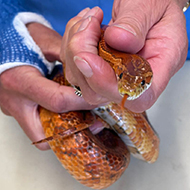
The charity is urging owners to keep their pets' enclosures secure.
As Britain faces its hottest day on record, snake owners are being urged to ensure their animals' enclosures are securely fastened as the hot weather can make them very active and more likely to escape.
The warning from animal charity RSPCA comes after a 3.5ft-long corn snake was found loose in a wheelie bin in Stoke-on-Trent earlier this month. The startled homeowner explained how he 'jumped and screamed' after lifting his wheelie bin lid to find the scaly adventurer staring back at him.
In 2021, the RSPCA received more than 1,200 reports about pet snakes needing help, with calls reaching a staggering 180 a month – or six a day - during June, July and August. As the temperatures continue to soar, the charity is asking owners to be especially cautious.
RSPCA scientific officer Evie Button said: “Snakes are excellent escape artists and will take the opportunity of a gap in an enclosure door, or a loose-fitting lid to make a break for it.
“Last year, we took over 1,200 reports about snakes, with the highest number of calls coming in during the summer months. This is not surprising, as snakes become more active during hot weather.
"We would urge all pet snake owners to be extra vigilant at this time of year, invest in an enclosure suitable for the particular species and make sure that enclosure is kept secure - and locked if necessary - when unattended.”
During the summer months, many owners like to take their snakes outside to enjoy the natural sunlight, but this also makes them more likely to escape. The RSPCA is calling on pet owners to ensure their snakes are secure when doing so, as they can move very swiftly on a sunny day.
Evie continued: “The needs of reptiles can be challenging to meet because they are just the same as they would be in the wild and are fundamentally linked to certain behaviours, diets or environmental conditions that can be difficult to replicate in a domestic environment.
“The RSPCA urges prospective owners of reptiles such as snakes to thoroughly research the needs of the particular species and what is required in the care of the animal, using expert sources. People should only consider keeping a snake if they can ensure they are fully able to provide for these needs.”
Image (C) RSPCA.



 The Animal and Plant Health Agency (APHA) has updated its online reporting service for dead wild birds.
The Animal and Plant Health Agency (APHA) has updated its online reporting service for dead wild birds.